I am sure everyone has heard the proverb “do not judge a man until you walk two moons (or a mile) in their moccasins.” This proverb has sunk deep within me over the past two months and has led me to much reflection. Since I have returned from my recent travels I have been humming and hawing on how to sum up my travels over the past two months. (Even though my travels have thus come to a close, my blog will continue on – well that is the goal.) The questions on my mind have been: how can I put into words what I have experienced, and what is the most important message I can share with others? I have, in a way, been able to narrow it down to this proverb: that to understand a culture and people and to learn from them we must learn “to walk in their moccasins.”
It is not until you are actually in that person’s moccasins that you begin to understand their situation. It was not until I was actually standing in a village close to 4,000 metres and a 3 to 4 day walk from any road did I realize the isolation these people face and the harshness of their environment. It was not until then that I realized how much I take for granted in terms of opportunities for education, health care and even the opportunity to practice my Christian faith. We encountered an 8-year-old girl who was sent by her uncle to this isolated mountain village to work in a trekkers’ lodge all alone with no family or friends. She was taken out of school and placed in the most remote village with no hope for her future and with no freedom to choose for herself. Through this encounter I was able to glimpse into what it is like for some young girls in Nepal.
The organization Mountain Child I was working with in Nepal has a program called R.A.N.C.H. (Remote Areas of Nepal Children’s Home) where they rescue children living in remote areas and give them a home and education based on Christian teachings. I did not realize what it meant to be “persecuted” for one’s beliefs until this one girl shared her story with me. She went back to her village for Christmas where she found her family had been murdered due to their recent conversion to Christianity. How this young girl must have felt!
My travels then took me to a country where growing up I imagined would be a dangerous and terribly gruesome place to visit, Rwanda, but was the complete opposite. Not only was the country safe, well-organized and clean but the people were so friendly that it seemed as though everyone was one big family. It blew my mind and all my pre-conceptions out of the water. Also, of what I had learned in school, through the news and in books about the 1994 Genocide it did not sink in until I was actually sitting next to a survivor of the Genocide listening to her heart-wrenching story as tears poured down her face. It was not until I was standing in a room surrounded from wall to wall with baby pictures of victims with plaques reading: “Name: Nathaniel, Age: 5, Favourite food: fried potatoes, Last Words Spoken: “Mommy, where can I run to?”, Died: hacked by a machete”, that it struck me to the core of my emotions how much the Genocide affected this country and its people. When Angelique, the orphan girl I was staying with, shared her story – and everyone Rwandan has a story- she said, “I do not know where my family is. Their bodies could have floated down the river, thrown down a latrine, burned. I do not know.” To be there listening to her story right beside her as we sat on a bench sheltering ourselves from the torrential rain with our flimsy umbrella, and seeing in her eyes the pain and the sorrow leaves an indelible mark on one’s soul. I will never forget, and most certainly no Rwandan will ever forget. I am actually having a difficult time even writing about this, and for Angelique she told me that if I were to ask her to share her story maybe 2 years ago there would be no possible way she would be able to. Most people now are starting to open up and to share and if you ask them they will most likely say yes. Healing has occurred and a new generation of hope is being born.
To walk in one man’s moccasins means embracing their lifestyle and coming from a western country I have not experienced what it is like to live in poverty. My past experience in the D.R. Congo gave me a perspective into this, but I really did not “live” in poverty. Our volunteer house had a shower (no hot water though), a toilet (with no flusher), a gas stove, and we had enough money from our stipends to afford nutritious food and to eat 3 meals a day. I was able to live with Angelique for a short time in Rwanda and it was there that I truly experienced to be in “want” and what to “live in poverty” really meant. With nothing in their cupboards, their family buys food for each day, well that is if that have the money for that day and if not then they will not eat. Usually they will eat twice a day, but sometimes only one big meal a day. Angelique, not only is an orphan herself but is a mother of 4 other orphans. She is the one working to feed all of them and it is lucky for her that she was given a house as a gift from a wealthy family because if not she would be on the street like many other orphans.
In the village of Aru, D.R. Congo, where I spent all of last year I was able to connect again with the people there and see how their lives have been evolving, what they need help with and their current struggles and difficulties. Again, I have only become more and more grateful for the opportunities I have living in Canada as I listen to their stories. Bolingo, a young guy about 22 years old, wants to study English so that he can later go on to study Law. He wants to build a house so that when he does get married he will have somewhere to live. He wants what most young guys in Canada would want, but the difficulty lies in making this possible since work and money is scarce. The things we take for granted these people fight much harder for which inspires me to have this same determination and perseverance they have to achieve the dreams I have in my life.
Another personal encounter where I came to realize yet again something I take for granted, was with a young Congolese girl named Esther. When I was leaving I told her how much I appreciate and love how joyful she is and that is truly is a gift. Her words in return still send cold shivers down my spine, which were, “But Lydia, I do not receive any love.” This did not make saying our goodbye any easier and froze me to the spot. It was probably one of the most difficult goodbye’s because I just wanted to stay and love her and affirm her for who she was created to be. I know her situation at home is difficult and she must find work wherever she can but every human being needs to be loved; we were all created to love and to be loved.
I am realizing now that I have already written a lot and do not want to drag on this post too long. It is too difficult to include every personal experience I have had during these past two months of travels but I hope to put together a photo album with various stories to give a greater insight into the situations of different people living in different places of the world and what I have learned from them.
The deepest impression that has stayed with me during my travels is that us human beings are all united, we are all one family and we all share the same human desires, no matter where we are in the world and what our situation may be. This makes me think of the poem by John Donne, which reads:
“No man is an island, entire of itself; every man is a piece of the continent, a part of the main. If a clod be washed away by the sea, Europe is the less, as well as if a promontory were, as well as if a manor of thy friends or of thine own were: any man’s death diminishes me, because I am involved in mankind, and therefore never send to know for whom the bell tolls; it tolls for thee.”
A young girl in a remote mountain village in Nepal is just as important as a kid growing up in a suburban town in North America. Both will have the same desire to go to school, to build good friendships, to have a family that loves them and to run and play and be free. It is so easy for us to get wrapped up and think only of our own current realities and to forget about our brothers and sisters in other parts of the world. We are all united together as one family, and the development of peoples needs to be based upon this recognition and not just as people living side by side together. I would like to share a few excerpts – or food for thought – from Pope Benedict’s Encyclical Caritas in Veritate which speaks about the importance of relationships and community and how that plays a role in development.
“As a spiritual being, the human creature is defined through interpersonal relations. The more authentically he or she lives these relations, the more his or her own personal identity matures. It is not by isolation that man establishes his worth, but by placing himself in relation with others and with God. Hence these relations take on fundamental importance. The same holds true for peoples as well. A metaphysical understanding of the relations between persons is therefore of great benefit for their development. In this regard, reason finds inspiration and direction in Christian revelation, according to which the human community does not absorb the individual, annihilating his autonomy, as happens in the various forms of totalitarianism, but rather values him all the more because the relation between individual and community is a relation between one totality and another. Just as a family does not submerge the identities of its individual members, just as the Church rejoices in each “new creation” (Gal 6:15; 2 Cor 5:17) incorporated by Baptism into her living Body, so too the unity of the human family does not submerge the identities of individuals, peoples and cultures, but makes them more transparent to each other and links them more closely in their legitimate diversity.”
“Because it is a gift received by everyone, charity in truth is a force that builds community, it brings all people together without imposing barriers or limits. The human community that we build by ourselves can never, purely by its own strength, be a fully fraternal community, nor can it overcome every division and become a truly universal community. The unity of the human race, a fraternal communion transcending every barrier, is called into being by the word of God-who-is-Love. In addressing this key question, we must make it clear, on the one hand, that the logic of gift does not exclude justice, nor does it merely sit alongside it as a second element added from without; on the other hand, economic, social and political development, if it is to be authentically human, needs to make room for the principle of gratuitousness as an expression of fraternity.”
What life really comes down to is relationships and taking the time to “walk a mile or two moons, or a city block” in another person’s shoes and get to know what their situation really is like. This is a difficult task since it means letting go of our securities, our ideals, our mentalities and listening, being attentive and courageously stepping out of our comfort zones. Everyone has a story, everyone has a voice and how beautiful it would be if everyone could have the freedom to share theirs and have their worth and dignity upheld!



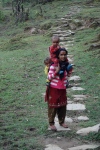



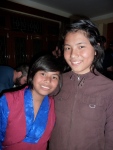
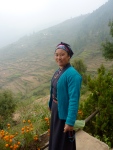
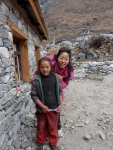

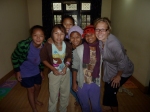



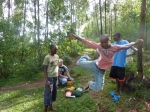




















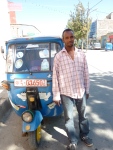
Again, to see the descriptions on each photo you need to click “permalink” to be able to view them